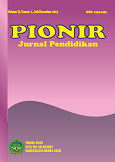THE IMPACT OF THE CASEL MODEL WITH SIMULATION ON FIFTH GRADERS' LEARNING OUTCOMES IN GOTONG ROYONG
DOI:
https://doi.org/10.22373/8ymm7363Keywords:
CASEL learning model, simulation method, learning outcomesAbstract
This study explores the impact of using the CASEL learning model with simulation methods on fifth graders' understanding of Pancasila Education, focusing on gotong royong a cultural value stressing cooperation and tolerance. This value is essential for developing students’ social-emotional and cognitive competencies. To ensure both groups started equally, a balance test using daily repeat scores was conducted before treatment. Learning outcomes were then measured with a posttest and compared using an independent t-test. Results showed that students using the CASEL model with simulations achieved better learning outcomes than those taught with traditional methods. Not only did their conceptual knowledge improve, but their social-emotional competencies also increased significantly when these elements were combined. Therefore, the CASEL learning model with simulation presents an effective alternative strategy to enhance the quality of Pancasila Education. It offers teachers a practical approach to design interactive and collaborative learning experiences. Additionally, this model supports schools in providing adequate facilities needed for effective simulations, helping create a dynamic learning environment that fosters both cognitive and social-emotional growth in students.
Keywords: CASEL learning model, simulation method, learning outcomes
Downloads
Published
Issue
Section
License
Copyright (c) 2025 Indah Dewi Eka Sari

This work is licensed under a Creative Commons Attribution-ShareAlike 4.0 International License.
- Authors retain copyright and grant the journal right of first publication with the work simultaneously licensed under a Creative Commons Attribution License that allows others to share the work with an acknowledgment of the work's authorship and initial publication in this journal.
- Authors are able to enter into separate, additional contractual arrangements for the non-exclusive distribution of the journal's published version of the work (e.g., post it to an institutional repository or publish it in a book), with an acknowledgment of its initial publication in this journal.
- Authors are permitted and encouraged to post their work online (e.g., in institutional repositories or on their website) prior to and during the submission process, as it can lead to productive exchanges, as well as earlier and greater citation of published work (See The Effect of Open Access).

